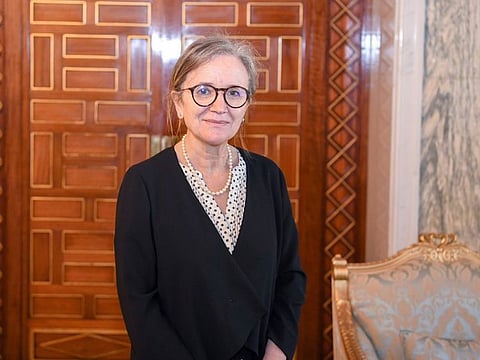The first Arab female Prime Minister: It had to be in Tunisia
In failure or success, Najla Bouden-Ramadhane has reserved her place in our history books

Tunisian engineering professor Najla Bouden-Ramadhane may not actually be the first woman ever to lead a council of ministers in this region. But she can surely claim the lead in our modern history.
For hundreds of years, and until the beginning of the 20th century, it wasn’t rare for women to rule in the Arab world. History books are full of names of prominent, strong-willed women who ruled powerful states. Most famous of those women is Balqees, the Queen of Sheba (or Saba in Arabic), who ruled a vast kingdom more than 5,000 years ago in present-day Yemen.
Balqees was followed by a long line of famous women who ruled in many parts of the Arab world. One of them is Shajarat Al Durr, who took the throne of Egypt in 1250 following the death of her husband and was instrumental in defeating the crusaders.
Even in the Arabian Peninsula, and during the region’s most conservative times, a woman ruled a tribal kingdom. Fatima Al Zamil, from the powerful Shammar tribe, ruled the Hail Kingdom, in the northern part of the Peninsula, from 1911 to 1914.
Tunisia sets the example
However, in the modern-day Arab World, and especially after the creation of the nation states following the First World War, women took a back seat in politics. We had to wait for decades before women managed to gain seats on the government tables as ministers or in parliaments. But as Prime Minister, Bouden-Ramadhane, the Tunisian lady who has been appointed last week by President Kais Saied, is the first. And that had to be in none other than Tunisia.
Since its independence in 1956, Tunisia has been at the forefront of women’s rights in the Arab world due to what is widely described as ‘feminist policies’ of the first president of the republic, Habib Bourguiba. He enacted a revolutionary Personal Status Code (PSC) in the same year, brushing off all opposition from religious and conservative leaders.
The law gave women unprecedented rights, unheard of even in Western countries, such as the right to vote, to get free abortions, to prevent polygamy, and the right to divorce. A staunch secular himself, Bourguiba is often said to be also influenced in those policies by his second wife, Wassila Ben Ammar, the highly educated daughter of a bourgeois family.
For years, particularly the last 20 years of the then ageing and frequently ill President Bourguiba, Wassila was the woman in charge, the real power, according to senior officials of the state. Until the president was forced to step down in 1987, she took care of almost all important policy decisions, including the appointment of Prime Minister Mohammed Mzali in 1980.
An obituary of Wassila, published by the French newspaper Le Monde upon her death on 22 June 1999, revealed that she was the one who took the decision to invite the late Palestine leader Yasser Arafat to set up the headquarters of the Palestine Liberation Organisation (PLO) in Tunis following Israel’s invasion of Beirut in 1982 — a decision that has eventually changed the face of the Arab-Israeli conflict.
Playing a key role in nation’s development
Against this background, Tunisian women played a key role in their nation’s development. And even after the end of the autocratic rule of Bourguiba’s successor Zine El Abidine Ben Ali in 2011, at the start of the so-called Arab Spring, women played a prominent role in the transition to democracy in Tunisia.
Thus, it comes as not a surprise that this country would appoint the first Arab female Prime Minister. Although, little known before the news broke on Wednesday, a quick read in Najla Bouden Ramadhane’s CV shows that she was in fact appointed because of her competence and not because of her gender.
A 63-year-old professor of geosciences at the National Engineering School in Tunis with reasonable international experience due to her work with the World Bank, she was in charge of education reforms in the past two governments.
President Saied described Bouden-Ramadhane’s appointment as “historic and an honour for Tunisia and a tribute to Tunisian women”. This grandiose description indeed places an enormous burden on the until recently obscure bureaucrat. By defining those boundaries, the gender reference, her failure will be seen as women’s failure, a setback. And the current conditions in Tunisia are not the happiest by all means. A mission impossible no less.
Tunisia is faced with one of its worst economic crises since independence because of the failure of the post-revolution governments to enact necessary reforms coupled with the impact of the coronavirus pandemic. Unemployment and inflation are both at record highs. State revenues have declined, and its debt is quickly rising. Then there is the political impasse, which led to the President’s decision two months ago to sack the government and suspend the parliament.
There are no easy solutions to these unfriendly conditions. Any politician, even the most savvy and experienced ones, will find it hard to steer the country back to shore. With the spotlight expectedly on her because of her gender, Bouden-Ramadhane will find it even harder to placate her supporters, let alone her critics. She might, by some sort of miracle, pull it off. She might fail, as some expect of course. That remains to be seen.
One thing is sure though. She has already reserved her place in our modern history as the first Arab female Prime Minister — a milestone that will hopefully open the door to other talented women across the region.
Sign up for the Daily Briefing
Get the latest news and updates straight to your inbox






